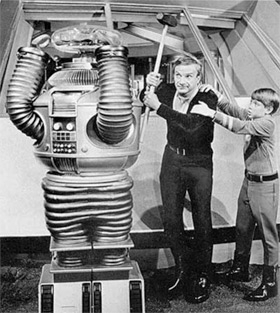 If IBM’s computer, Deep Blue, can beat chess masters and their follow-up, Watson, can win on “Jeopardy,” when can the “premium robot” Sherlock help us win
premium programmatic?
If IBM’s computer, Deep Blue, can beat chess masters and their follow-up, Watson, can win on “Jeopardy,” when can the “premium robot” Sherlock help us win
premium programmatic?
Before we dive into the computer invasion, let’s cover the basics. Many people ask why there doesn’t seem to be an accepted definition for
premium programmatic in light of the massive press it receives. In an environment that demands simplicity and transparency, the industry delivers complex and opaque services. Today’s market
sometimes places the computers (automation) versus the consultants (trading experts). When a digital media space is in its beginning stages, the industry needs consultants to help everyone with the
definitions and strategies. Right on the heels of these consultants are new start-ups and technology platforms to help premium programmatic — hence the battle of humans versus
computers.
advertisement
advertisement
By definition, premium denotes above the usual or nominal price. Programmatic connotes real-time bidding, automation and commoditization. Humans and computers
can both agree here.
One of the first computer winners was Big Blue, who mastered a rule-based game like chess. But it took a while longer for IBM to develop Watson, which
would go on to win a game like “Jeopardy.” Watson became more human-like with its ability to problem-solve by gathering data, validating the data, make decisions, and then change
judgments based on the data and results. Many believed this computer was “learning” and that artificial intelligence can bring more market or network-based solutions onboard to our
exchanges. This would ensure we rely less on humans.
Another way for computers to solve the problems with programmatic is to examine the features that many brands ask for.
This includes ensuring the remnant and premium marketplaces are differentiated in a programmatic environment. Despite the massive height of programmatic hype, the promises of premium programmatic
expectations are being met with lower prices and more automation. Much of the confusion is human or market generated; however, many of the multiplier gains are from both computers and
experts.
Both humans and computers are feeling uniquely comfortable learning multiple channels, buying upfront, providing guarantees, and offering social and native
advertising. Both understand that the days of running a single channel for an effective advertising campaign are gone. The variety makes everyone happy, especially when programmatic buyers and sellers
are comfortable with any advertising outlet that fits into the marketing plan. When someone has too many channels to evaluate, computers can step in to measure and optimize a mix of media after the
strategy from the expert is in place.
In the finance world, computers understand buying upfront with forward markets very easily. They are constantly learning, guaranteeing
and providing upfront opportunities for buyers and sellers. However, smart publishers ultimately control scarcity and inventory. The more sellers look for premium, the bigger the upfront bidding and
markets grow by offering more choices. In many cases humans — not computers — can get more upfront deals by playing the system, timing, and relationships.
Social
media can improve at trading programmatically as both humans and computers begin to trade using multiple measures to optimize things like display (CTR), video (attention), native (engagement) and
social (view through attribution). Today, many experts are beating the computer social media platforms by understanding that earned and owned media needs more measurement
Marrying
native and programmatic makes sense, but custom branded content usually requires some heavy lifting by humans. However, now that others are creating the content automatically, computers are feeling
comfortable optimizing ad units in regards to the content as opposed to solely relying on the placement. Measuring out of the banner is always possible, therefore optimizing outside the banner in the
form of content makes sense for humans.
Despite programmatic, it will take the best media trading experts as well as the best computers and platforms to get to an ideal trading system. The
search for the perfect trading system (computers and humans) is as old as the markets themselves. No shit, Sherlock.